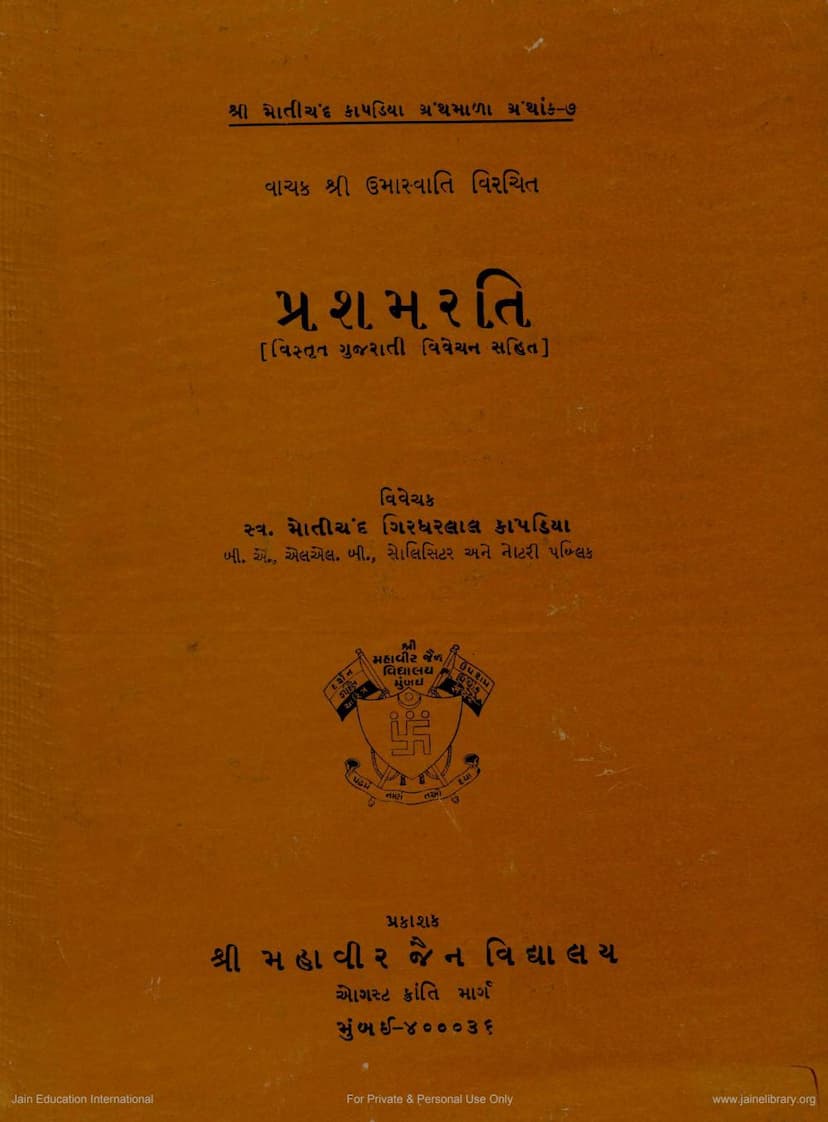Prashamrati Prakaran
Added to library: September 2, 2025

Summary
I cannot access external websites or specific files from URLs, including the catalog link you provided. Therefore, I am unable to provide a summary of the Jain text "Prashamrati Prakaran" based on the content of that link.
However, based on the information from the pages you did provide, here's a summary of what can be gathered about the Jain text "Prashamrati Prakaran":
Title: Prashamrati Prakaran (પ્રશમરતિ) Author: Acharya Umaswati (also referred to as Umaswami) Commentator/Critic: Late Motichand Girdharlal Kapadia (B.A., LL.B., Solicitor and Notary Public) Publisher: Mahavir Jain Vidyalay, Mumbai Theme: The book is considered a significant text on Jain conduct and ethics. It elaborates on the Jin-proclaimed methods to overcome attachment and aversion, the causes of suffering. The text is described as simple, logical, heart-touching, thought-provoking, conducive to detachment, and promoting introspection. It focuses on conduct rather than logical arguments or refutations, outlining the principles of conduct as established in the Agamas, particularly the Acharangasutra.
Content and Structure:
- The text is composed of 314 Sanskrit verses (gathas).
- It deals with the principles of conduct, aiming to defeat attachment and aversion.
- The commentary by Motichand Kapadia provides a detailed explanation in Gujarati.
- The text is described as accessible to both ascetics (yati) and lay followers (shravak).
- The book covers topics such as:
- The nature of attachment and aversion (raag-dvesh).
- The causes of suffering.
- The path to overcoming them as prescribed by the Jinas.
- The importance of conduct (Achar).
- The collection of principles from the Agamas, especially Acharangasutra.
- It also touches upon tattvas (principles/realities), Dravyas (substances), and Kevalisamudghata (a state of liberated beings).
Significance and Commentary:
- The commentary by Motichand Kapadia, written between 1949-50, was previously unpublished and is being published for the first time.
- Kapadia is described as a scholar, devoted to knowledge, religious-minded, inwardly inclined, and a householder practitioner with deep scriptural knowledge. His commentary is noted for its simplicity, depth, and experiential resonance.
- The publication of this commentary is the seventh volume in the "Shri Motichand Kapadia Granthamala" series, funded by his family in his memory.
- The publisher, Mahavir Jain Vidyalay, expresses joy in presenting this work, highlighting Kapadia's dedication to Jain literature.
- The text draws parallels with Tattvarthasutra, presenting a more conduct-oriented approach compared to the philosophical depth of Tattvarthasutra.
Authorship:
- The authorship of Prashamrati is attributed to Acharya Umaswati (Umaswami), who is also credited with Tattvarthasutra. This is supported by references in Tattvarthabhashya by Siddhasena Gani and Haribhadra Suri's commentary on Prashamrati itself.
The provided text also includes:
- A preface from the publisher.
- An editorial statement.
- A comparison of slokas from Prashamrati with verses from Tattvarthasutra, indicating shared themes and potentially common authorship.
- A detailed introduction to the life and works of Acharya Umaswati, including his known compositions like Tattvarthasutra and Tattvarthabhashya.
- A significant portion of the provided text consists of the Gujarati commentary on the Sanskrit verses of Prashamrati, delving into the meaning and implications of each verse in detail. For example, the initial sections focus on the introductory verses, explaining the auspicious beginnings (mangalacharan), veneration of deities, and the author's humility. Subsequent sections delve into the core themes of detachment (vairagya), the nature of vices (kashayas), the pursuit of happiness, the contemplation of impermanence (anitya bhavna), the virtue of non-violence (ahimsa), and the importance of conduct (achar).
In essence, Prashamrati Prakaran, with its extensive Gujarati commentary, serves as a practical guide to Jain conduct and spiritual discipline, emphasizing the importance of righteous living to overcome suffering and achieve spiritual liberation.